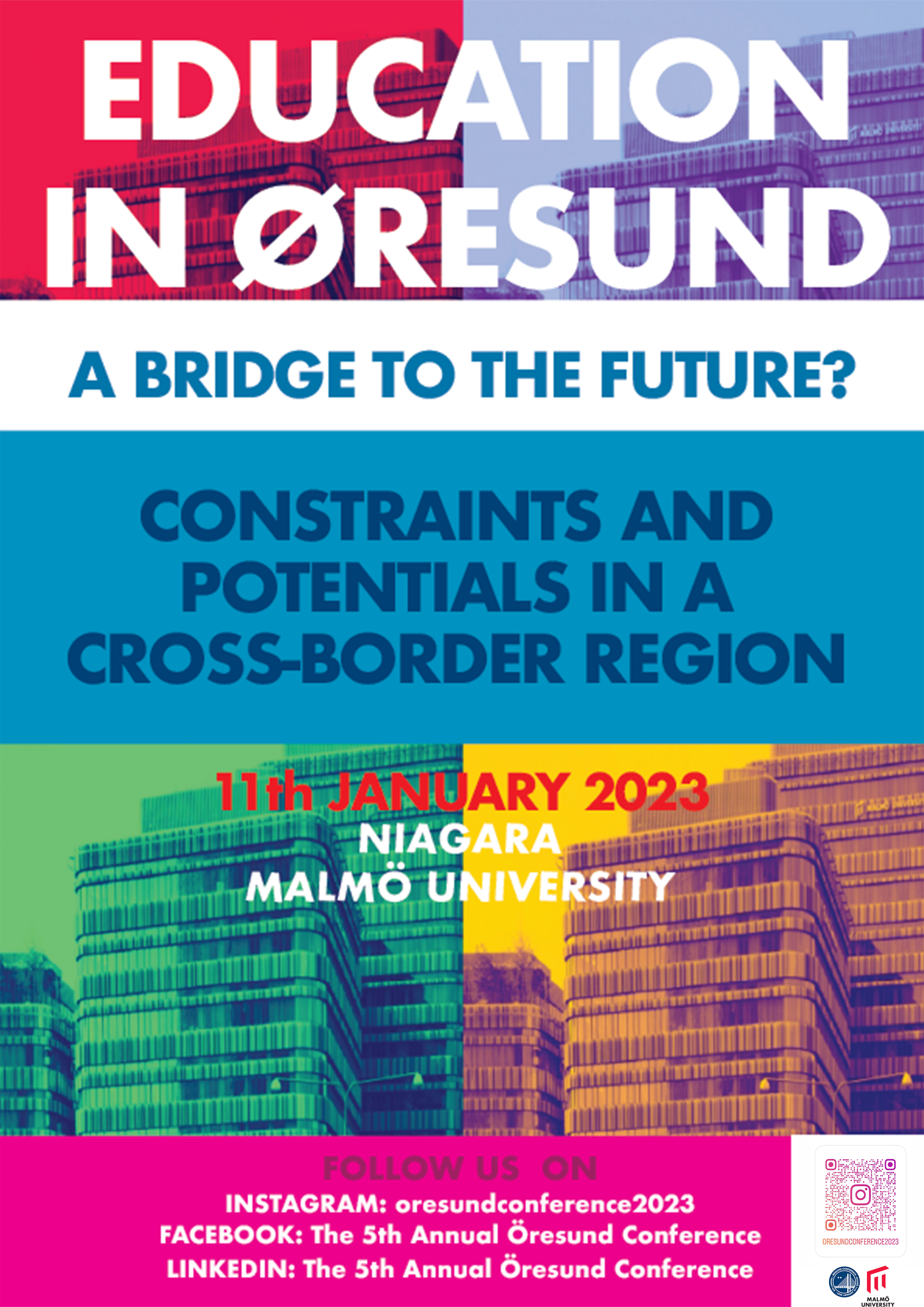Universitetsavisen
Nørregade 10
1165 København K
Tlf: 21 17 95 65 (man-fre kl. 9-15)
E-mail: uni-avis@adm.ku.dk
Konference
Konference — Education in the Öresund Region: A Bridge to the Future? - Constraints and Potentials in a Crossborder Region On January 11th 2023, the third year students of European Studies at Malmö University are organizing the 5th annual Öresund Conference. The conference is going to focus on education in the Öresund region. With the help of guest lecturers, we will explore the state of education from three perspectives: the past, present and future, with an aim to identify both constraints and possibilities that have emerged in the cooperation after the opening of the Öresund bridge in 2000.
Date & Time:
Place:
Malmö University
Nordenskiöldsgatan 1,
the first floor of Niagara.
Hosted by:
Malmö University 5th semster European Studies students
Cost:
Free
The fifth-semester European Studies students are organizing the Fifth Annual Øresund Conference at Malmö University on 11th January 2023. The event will be brought back as a live conference after two years of online seminars due to the COVID-19 pandemic.
The Fifth Annual Øresund Conference is a platform that welcomes scholars, politicians, and students from around the Øresund region to discuss the challenges and the future opportunities of the region, its education systems, and its labor market. The event is divided into panels and lectures, each aiming to tackle a unique set of issues:
LECTURE + QA
Commuting in the Region for Academic Purposes
A total of seven regional centers have been established within Region Skane: Malmo, Lund, Helsingborg, Landskrona, Hassleholm, Kristianstad, and Ystad. These centers are expected to provide various key services, among others. Regarding commute times and the number of transfers, residents of different urban areas and municipalities are in different positions when commuting to regional centers. Smaller localities tend to have fewer public transportation options available in regional centers than larger ones. There is, therefore, a possibility that students from different parts of the province may experience different adverse effects from an increasingly long and challenging commute.
LECTURE + QA
Education During the Pandemic: Challenges and Possibilities
The COVID-19 pandemic has been a historical shock to education systems worldwide. Countries around the world have implemented unprecedented containment measures to control the spread of the coronavirus: schools, colleges, and universities were closed. At universities, the closure brought difficulties for students and staff alike.
In 2020, the share of adults enrolled in formal and non-formal education in OECD countries decreased by 27% compared to 2019. Even though the pandemic accelerated the reliance on digital tools and enabled education to be conducted online, the quick shift to distance learning drew attention to the value of teacher-student interactions and the importance of connected interactions, e.g., socialization processes between students. As educational institutions have resumed operations following the most severe disruption of their services for many decades, it is time to evaluate the challenges and perhaps even the opportunities that the pandemic has created and what could be the new normal in the region.
PANEL DISCUSSION
Danish and Swedish Higher Education Systems
A critical component of the Øresund Region’s economy is knowledge-intensive activities. In addition to being a cross-border location of particular significance, it is also famous for its higher education and research institutions. It is estimated that about twelve universities and other educational institutions in the region offer students an array of educational opportunities along with stimulating research and development environments. As a result, they are attracting students from outside the region within their respective countries and from abroad. In addition, they are also considered to be key actors in cross-border innovation. Despite this, the national dimension plays an important role in education across the region since the national governments regulate both the Danish and Swedish higher education systems. The panel discussion will focus on how higher education systems are organized in both countries.
PANEL DISCUSSION
Social Sciences and Humanities in the Øresund Region: [Im]possible Regional Cooperation?
There has never been anything like the Øresund University in the academic world, not only in Denmark and Sweden but also globally. It is almost impossible to find university collaborations across borders of the same size and ambition from the same period. When the Øresund University was first established, the summer university was a junior activity, focusing primarily on students and teaching. In contrast, Øresund University had, from the beginning, a broader and more profound purpose to which Lund University and the University of Copenhagen management were committed. Nevertheless, the idea gradually lost its sharpness, clarity, and focus. As a result, it faded out and died on its own. Although, it is important to note that the region’s universities have not slowed down or accelerated since.
PANEL DISCUSSION
From Education To the Labour Market
Studying a particular degree subject may lead to a well-paid dream job, which is undoubtedly one of the main motivating factors for participation in tertiary education. While studying any degree may give one an automatic passport to success in the workplace, no one can guarantee this will be the case. Many OECD countries currently have roughly one-third of their university graduates working non-graduate jobs, which challenges the assumption that most tertiary graduates are guaranteed high-skilled employment. The work of the Øresund Committee gave special attention to labor market issues, which is not surprising. In what ways does the current situation in the region differ from that of the past?
